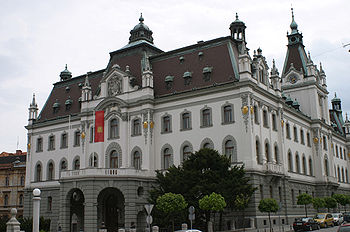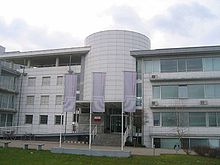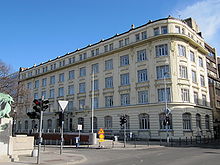历史
Beginnings
Although certain academies (notably of philosophy and theology) were established as parts of Jesuit-led higher education as early as the 17 century, the university as such had first been founded in 1810 under the named Écoles centrales by the French Imperial administration of the Illyrian Provinces. The university was disbanded in 1813, when the Austrian Government regained control.
The quest for a national university
During the second half of the 19th century, several political claims for the establishment of a Slovene language university in Ljubljana were made. They gained momentum in the fin de siècle era, when a considerable number of renowned Slovene academians worked throughout Central Europe, while ever more numerous Slovenian students were enrolled in foreign-language universities of the Austro-Hungarian Empire, particularly in the Austrian and Czech lands. In the 1890s, a unified board for the establishment of a Slovenian university was founded, with Ivan Hribar, Henrik Tuma, and Aleš Ušeničnik as its main leaders. In 1898, the Carniolan regional parliament established a scholarship for all those students who were planning a habilitation under the condition that they would accept a post at Ljubljana University when founded. In this way, a list of suitable faculty started to emerge.
Nevertheless, unfavorable political circumstances prevented the establishment of the University until the fall of the Austro-Hungarian Empire. With the establishment of the State of Slovenes, Croats and Serbs in 1918, the founding of the university became possible. On November 23, 1918, the first meeting of the Founding Board of Ljubljana University was called, presided over by Mihajlo Rostohar, professor of psychology at the Charles University in Prague. Together with Danilo Majaron, Rostohar convinced the Yugoslav central government in Belgrade to pass a bill formally establishing the university. The bill was passed on July 2, 1919; in late August, the first professor were appointed and on September 18 the full professors established the University Council, thus starting the normal functioning of the institution. The first lectures started on December 3 of the same year.
First decades

The main building of the university on the Congress Square
In 1919, the University comprised five faculties: law, philosophy, technology, theology and medicine. The seat of the university was in the central Congress Square of Ljubljana in a building that had served as the State Mansion of Carniola from 1902 to 1918. The building was first designed in 1902 by Jan Vladimir Hrásky, and was later remodelled by a Czech architect from Vienna, Josip Hudetz.
In the mid 1920s, the university was renamed the "King Alexander University in Ljubljana" (Universitas Alexandrina Labacensis) and continued to grow and develop both in size and quality despite financial troubles and constant pressure from Yugoslav governments’ centralist policies. In the 1930s, the university became the platform for numerous student activities, both cultural and artistic as political. In 1941, Jože Plečnik's National and University Library was completed, as one of the major infrastructure projects of the University in the interwar period. After the invasion of Yugoslavia in April 1941, the University continued to function under the Italian and Nazi German occupation, despite numerous problems and interference in its autonomous operation. Several professors were arrested or deported to concentration camps and large numbers of students joined either the Liberation Front of the Slovenian People or the Slovenian Home Guard.
After 1945
After the establishment of Communist Yugoslavia in 1945, the university was again put under political pressure: numerous professors were dismissed, some were arrested and tried, and the Theological Faculty was excluded from the University. Some of the most brilliant students emigrated. Nevertheless, the University managed to maintain its educational role and even regain a limited degree of autonomy from the mid 1950s onward. In the 1960s and early 1970s it again became a lively platform for various student activities. It suffered a serious setback in autonomy from the mid 1970s to the early 1980s, when some professors were again dismissed by the authorities. In 1979 it was renamed "Edvard Kardelj University in Ljubljana" after the Communist leader. In 1990, with the fall of Yugoslavia, it was regiven its original name.
Since the mid 1980s, the university has managed to expand and catch up with advanced Western currents in all fields. Despite increasing competition from other Slovenian universities, it remains the largest and central institution of higher education in the country. On a domestic and international level, the study courses run at the University of Ljubljana and its projects follow the latest world discoveries and trends in the field of arts, science and technology, to which the contribution of numerous Slovenian professors and researchers is of great importance.
Organisation

Faculty of Administration in the Bežigrad district

Faculty of Law near Dragon Bridge
As of 2010, the university has 23 faculties and 3 academies, situated throughout urban Ljubljana:
- Academy for Theatre, Radio, Film and Television
- Academy of Fine Arts and Design
- Academy of Music
- Faculty of Administration
- Faculty of Architecture
- Faculty of Arts
- Biotechnical 教职员工
- Faculty of Chemistry and Chemical Technology
- Faculty of Civil Engineering and Geodesy, Faculty of Civil Engineering and Geodesy
- Faculty of Computer and Information Science
- Faculty of Economics
- Faculty of Education
- Faculty of Electrical Engineering
- Faculty of Law
- Faculty of Maritime Studies and Transport
- Faculty of Mathematics and Physics
- Faculty of Mechanical Engineering
- Faculty of Medicine
- Faculty of Natural Sciences and Engineering
- Faculty of Pharmacy
- Faculty of Social Sciences
- Faculty of Social work
- Faculty of Sport
- Faculty of Theology
- Veterinary 教职员工
- Faculty of Health Studies
The university was initially located in the centre of Ljubljana where the central university building and the majority of its faculties are located. Later on, some new, modern buildings and a small scale campus were constructed in the northern part of the city (Bežigrad).
Profile
The University of Ljubljana practices basic, applied and development research, striving for excellence and quality of the highest standard in all fields of science and arts, such as the humanities, social sciences, linguistics, arts, medicine, natural sciences and technology. The University is known for the quality of its study courses in the humanities, and in scientific and technological fields, as well as in medicine, dentistry and veterinary science.
Based on its own research projects as well as advances in research at home and abroad, the University provides instruction and training to prominent scientists and experts, capable of leading sustainable development, with a view to respecting the legacy of European Enlightenment and Humanism as well as human rights. The University also promotes interdisciplinary and multi-disciplinary studies.
Achievements in the fields of science and arts are shared with other universities and institutions carrying out scientific research. It thus contributes its share to the world's treasure of knowledge and at the same time, disseminates this knowledge within the country’s borders. The University works in co-operation with various economic institutions in both the public and private sectors, with the government and local authorities as well as other civil institutions. In this way it encourages the harnessing and application of its research and educational achievements and contributes to social development.
The University of Ljubljana has a consolidating role in the academic community of professors, researchers, students and other associates, and strives to establish a fine reputation both at home and around the world. According to its statute, the research, education, public activities and relations among its members is carried out based on the following principles:
- Professional excellence or ensuring the highest possible quality;
- Academic freedom of its staff and students, particularly creative freedom;
- Autonomy in relation to the State, politics, capital or Church;
- Humanism and human rights, including equal opportunity and solidarity.
The University of Ljubljana houses the permanent seat of the International Association for Political Science 学生 (IAPSS), an international academic group consisting of 10,000 political science graduate and undergraduate students worldwide.
Prominent faculty and alumni
Further information: List of University of Ljubljana people
Since its foundation in 1919, the University of Ljubljana has employed several prominent faculty. Its alumni have formed the elite in the economic, political, social and cultural spheres in Slovenia.
参考文献
- ^ "Faculties". University of Ljubljana. 15 February 2010. http://www.uni-lj.si/en/academies_faculties_and_high_school/faculties.aspx.
更多
- Slovenian Academy of Sciences and Arts
- Jožef Stefan Institute
- Ljubljana Student Organisation
External links
- University of Ljubljana 网址



